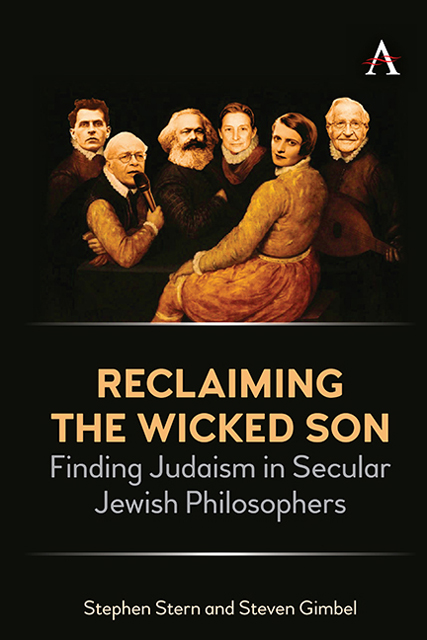Book contents
- Frontmatter
- Dedication
- Contents
- Introduction: Reclaiming the Wicked Son
- 1 Karl Marx and Materialistic Messianism
- 2 Ludwig Wittgenstein and Neo-Talmudic Thought
- 3 Ayn Rand and the Hassidic Courts
- 4 Peter Singer: The Amos of Anim
- 5 Judith Butler and Orthopraxy
- 6 Noam Chomsky, Kabbalist
- Conclusion: Re-Membering the Tribe
- Bibliography
- Index
4 - Peter Singer: The Amos of Anim
Published online by Cambridge University Press: 10 January 2023
- Frontmatter
- Dedication
- Contents
- Introduction: Reclaiming the Wicked Son
- 1 Karl Marx and Materialistic Messianism
- 2 Ludwig Wittgenstein and Neo-Talmudic Thought
- 3 Ayn Rand and the Hassidic Courts
- 4 Peter Singer: The Amos of Anim
- 5 Judith Butler and Orthopraxy
- 6 Noam Chomsky, Kabbalist
- Conclusion: Re-Membering the Tribe
- Bibliography
- Index
Summary
Peter Singer may be the most influential philosopher of the twentieth century in terms of cultural impact beyond the academy. His book Animal Liberation combined philosophical argumentation with muckraking reporting that launched the animal rights movement. Changes in commercial and scientific testing, the mainstreaming of vegetarianism, and reductions in factory farm ing cruelty coupled with the rise of free-range farming are all direct results of his philosophical work over four decades.
Singer is Australian, but his family was originally Austrian.
My family came from Vienna. My parents were Jewish, so when the Nazis took over Austria in 1938, they wanted to leave as soon as they could. Unfortunately, my grandparents didn't leave in time, so they all got sent to camps. Three of them died there. My grandmother miraculously survived, and she came to Australia in the same month that I was born. (interview on ABC-TV Australia, quoted in Animal, P.S. 2)
As the grandchild of victims of the Shoah, Singer became deeply concerned with the wellbeing of the vulnerable. As one of the most well-known ethicists of the twentieth century, he has been thoroughly committed to utilitarianism, a moral system that contends that moral rightness and wrongness is a result of the sum total of good and bad consequences, of pain and pleasure, generated by deliberate human actions. Every time we act, we change the world. Our actions have effects. Some of the effects are good and some are bad. Morality, through the principle of utility, demands that we choose our actions to create the best possible world when we democratically consider the wellbeing of everyone equally. No one is less than. Everyone's interests are considered equally.
This approach to ethics comes to us from late Enlightenment figures like Jeremy Bentham and John Stuart Mill. They argued that morality is not a matter of sentiment, but of reason. In this way, Singer follows his own grand father who perished in the camps.
There is a terrible, tragic irony in the fact that my grandfather (a classical scholar and a member of Freud's inner circle) spent his whole life trying to understand his fellow human beings, yet seems to have failed to take sufficiently seriously the threat that overwhelmed Vienna's Jewish community and ultimately led to the loss of his own life.
- Type
- Chapter
- Information
- Reclaiming the Wicked SonFinding Judaism in Secular Jewish Philosophers, pp. 57 - 74Publisher: Anthem PressPrint publication year: 2022

